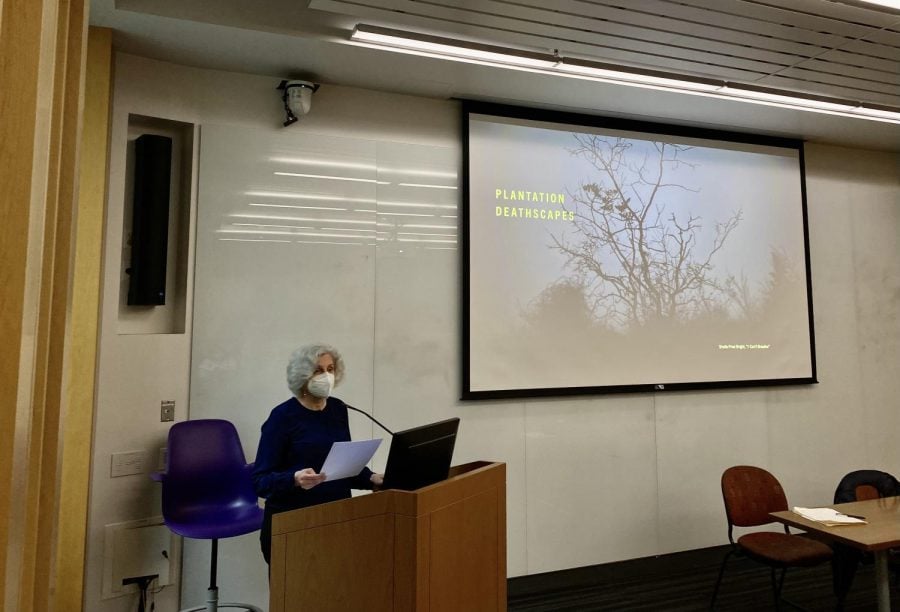Vanderbilt Prof. Teresa Goddu talks climate crisis, race and Gothic literature
Samantha Powers/The Daily Northwestern
Teresa Goddu gives a talk about the environment and race in Jesmyn Ward’s newest novel, “Sing, Unburied, Sing.” Goddu said the book, which depicts intersecting crises of the climate and racism, is Ward’s most Gothic work.
May 8, 2023
Vanderbilt University English and American studies Prof. Teresa Goddu gave a talk about the intersection of the environment, race and Gothic literature Monday.
Goddu’s talk was part of the English department’s American Cultures Colloquium, which brings scholars to Northwestern to examine American history through shared artifacts. Through a deep dive into Jesmyn Ward’s newest novel, “Sing, Unburied, Sing,” Goddu focused on the horrors of America’s plantation past and looked at the possibilities for repairing the damage of environmental degradation and anti-Black racism in the future.
“The first step toward fulfilling the novel’s message … ‘Protect life,’ is to support Black life,” Goddu said. “Racial justice is foundational in environmental and climate justice. The landscape cannot be healed until we bear witness to the Black suffering it holds.”
Gothic literature typically employs themes of fear and haunting, often invoking imagery of the environment and natural life. Goddu said “Sing, Unburied, Sing,” which touches on symbols of Black death in a plantation landscape, is Ward’s most Gothic novel.
English and American studies Prof. Julia Stern introduced Goddu. Stern praised Goddu’s work at Vanderbilt to design “The Sustainability Project” an interdisciplinary environmental effort that created of a new environmental and sustainability studies minor.
Third-year English Ph.D. student Michaela Corning-Myers organized the event after reading one of Goddu’s books. She said she realized they shared a lot of research interests surrounding “progress narratives” and the non-linear nature of time.
Corning-Myers said she thought Goddu’s talk generated a good turnout of people interested in climate literature.
“I was really interested in optimistic futurity in this talk, and thinking about the moments we can look at in the past where we can kind of excavate something hopeful for us to use in the future,” Corning-Myers said. “Considering the climate crisis we’re facing, that could be potentially really useful for us.”
During the talk, Goddu said she thinks of hope as “active.” She said in order to move forward with racial and climate justice, society must examine the past that led up to the current moment.
She said America’s plantation history, which represents a degradation of both Black life and natural life, is linked to the present anti-Blackness and climate crises.
“The Black earth and the Black body are inextricably entangled in Ward’s work, as are the history of environmental degradation and Black oppression,” Goddu said.
Second-year English Ph.D. student Yasmin Yoon, who attended the event, was curious about the combination of fields in Goddu’s “eco-Gothic” lens. She said she was already interested in racial ecology and that her research focuses on the intersection of financial and economic catastrophes.
As someone who studies race and environmental degradation in Asian American contemporary literature, Yoon said she appreciated Goddu’s examination of race.
“We usually think of race in bodies, but it’s actually a structural issue where race brings you closer to toxic environments,” Yoon said. “I think these new takes on race that don’t just focus on bad individuals and good individuals are really important.”
Email: [email protected]
Twitter: @sqpowers04
Related Stories:
— UC Berkeley prof speaks about ‘Accounting for Slavery’ at Kellogg
— Clint Smith discusses racial reckoning, slavery
— Residents, local activists convene to discuss climate-friendly improvements


